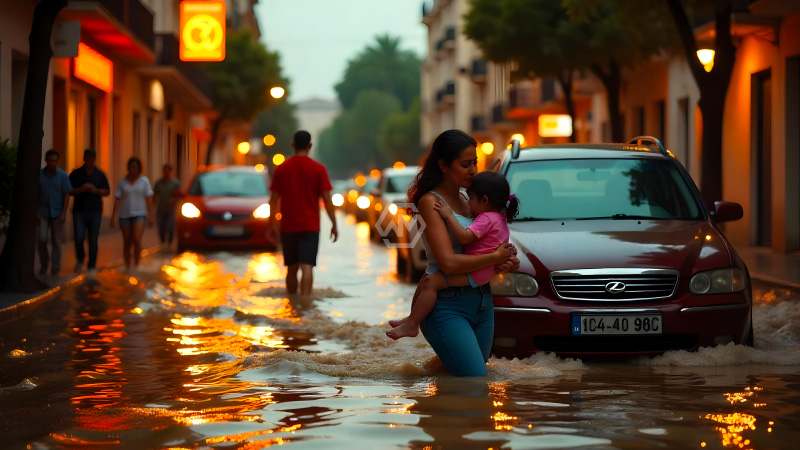- Torrential rains cause deadly flash floods in southeastern Spain, claiming at least 13 lives.
- Intense flooding damages roads, homes, and infrastructure, disrupting travel and trapping residents.
- Scientists link extreme weather events like these floods to climate change, citing warming Mediterranean waters.
Deadly flash floods have swept through southeastern Spain, with torrential rains inundating roads and towns. At least 13 people have died in the floods, which have primarily impacted the Valencia region, where rivers have overflowed, and floodwaters have carried vehicles through streets.
The floods have disrupted major transportation routes, including a high-speed train derailment in Malaga that fortunately did not result in injuries.
Rising Death Toll in Spain’s Flash Floods as Communities Face Ongoing Storm Threat
The recent flash floods in southeastern Spain, triggered by intense autumn rain, have devastated towns and communities across the region, with fatal consequences. The Valencia region has been especially hard-hit, where officials confirm that 13 lives have been lost. Children were among the victims, and with several people still missing, the toll could rise further. The severe weather has disrupted emergency responses, with authorities advising residents to stay indoors and avoid all non-essential travel.
Infrastructure damage has been extensive, with roads washed out, buildings inundated, and even a high-speed train derailed near Malaga. Luckily, passengers on the train escaped unharmed, but the incident underscores the far-reaching effects of the floods on transportation and public safety. In rural areas, rescue teams have used helicopters to airlift residents stranded by floodwaters, highlighting the challenging conditions emergency services face.
The Valencia region, often subject to autumn rains, has experienced increasing instances of severe weather. Experts point to climate change as a factor, noting that warming waters in the Mediterranean lead to higher levels of water vapor, fueling intense storms. Flash floods and extreme rains have become more frequent in recent years, with scientists warning that similar extreme events are likely to continue unless greenhouse gas emissions are reduced.
Residents and officials are grappling with the aftermath, as communities look to rebuild and support displaced families. Spanish media has documented the personal impact, with stories of families seeking missing loved ones and others returning to flood-damaged homes. The psychological and economic toll of these floods is substantial, with local governments coordinating efforts to assess damages and provide immediate relief. Storm warnings remain in effect, with continued rains expected until Thursday, prolonging the risks in affected areas.
As Spain faces devastating flash floods and rising fatalities, the ongoing storms pose a significant challenge for communities and emergency responders. Long-term solutions will likely require addressing both climate adaptation and mitigation measures.
“Meteorologists believe the warming of the Mediterranean, which increases water evaporation, plays a key role in making torrential rains more severe.”



